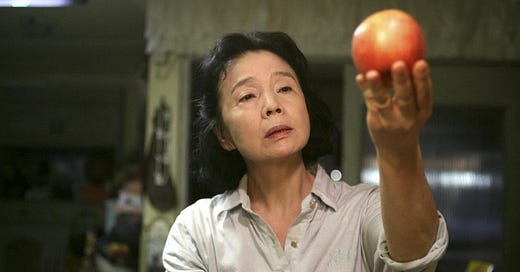For whatever reason, I went into Poetry thinking that it was going to be a break from Lee Chang-dong’s usual brand of tragedy. The only other Lee films I’ve seen — the devastating Secret Sunshine (2007) and the white-hot Murakami adaptation Burning (2018) — both feature lead characters coming to grips with a heinous crime. So in hindsight, even though I approached Poetry as “merely” the story of a woman finding herself in old age, I shouldn’t have been surprised when it entered familiar territory. After all: it does open with the image of a female body floating face-down in a river. Refreshingly, though, the film takes its time linking that moment to Yang Mi-ja (Yun Jeong-hie), the widow who occupies nearly every scene. Living off government cheese and a part-time job as a maid, she’s raising her emotionally vacuous grandson Jong-wook (Lee Da-wit) by herself; the boy’s single mother lives and works in Busan for reasons that aren’t entirely clear. By the time we understand Yang’s shocking connection to the suicide of a 16-year-old-girl — you guessed it, the corpse from the beginning — Lee’s masterful balancing act comes into full view. The narrative thread of Yang taking poetry classes and finding new meaning in life following an Alzheimer’s diagnosis somehow functions as the “A” plot, while the girl’s death, its buzzy aftermath, and Yang’s unlikely involvement almost fades into the background. Only a great filmmaker could pull that off, and what we’re left with is the story of a good person becoming even better before her brain starts to crumble. When she’s faced with something incomprehensible under her own roof, she chooses to prioritize herself; although some might find this selfish or irresponsible, Lee suggests that it’s actually the wisest choice. She’s lived her life and had her children, who are in turn failing their own. Why should that be on her? For Yang, perhaps the best thing to do is focus on beauty — not terror — before going gently into that sweet night.
Seen in 4K restoration as part of the Lee Chang-dong retrospective at the American Cinematheque; streaming on Kanopy.





